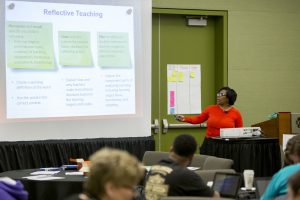Transformation Continues for Schools for Rigor
Classes resumed around the district on Tuesday after the annual winter break – with six notable exceptions.
The cohort of demonstration Schools for Rigor (Findley, Howe, Lovejoy and Perkins elementary schools; Weeks Middle School and North High School) remained closed for an extra day while their staffs attended the third of four designated training days sprinkled throughout the 2016/17 school year.
Under the guidance of “staff developers” from Learning Sciences International, teachers and administrators from those buildings gathered at the Iowa Events Center to build upon progress already achieved at the demo schools during Phase 1 of a tri-phased implementation process designed to create a new districtwide classroom instructional model that will be common across all grade levels.
The walls of meeting rooms were papered with colorful post-it notes during breakout sessions as participants continued to work their way from guinea pigs to role models for their peers at the rest of the district schools. All objectives are categorized TO DO, DOING or DONE. And Tuesday lots of them moved from TO DO to DOING.
Kathy Houpt is a Senior Consultant at LSI who is coordinating the training of the DMPS pilot cohort. Dr. Houpt describes progress to date as “awesome” because “it’s clear that the principals believe in the work” that’s underway and will be scaled up over the course of the next two years.
Phase 2 will occur in the 2017-2018 school year, when an additional cohort of schools begins the transformation. During Phase 2, the six pilot schools will become demonstration sites where teachers and administrators from other schools will visit and observe firsthand. The Phase 2 schools will be identified later this year.
Janis Ware is a reading interventionist at Findley. She’s been a DMPS teacher for 38 years and she likes the Schools for Rigor emphasis on what LSI calls Professional Learning Communities. PLCs are small groups of colleagues, teachers who share a grade level or subject area for instance, who collaborate regularly to everyone’s benefit, most importantly the students’.
“We interact in PLCs every day,” said Ware. “There’s one for every grade level. Sometimes Barb (Findley principal Barb Adams) even covers someone’s classroom so teachers can observe what’s working and effective for one another. There’s no substitute for teacher collaboration. Everything we do at Findley, everyone is on board.”
Importantly, the PLC collaborations are “non-evaluative.” Teachers can share concerns and problems with one another without fear of judgment by their principal.
“Just as we equip teachers with standards trackers to monitor student progress, we give them growth trackers that are confidential tools they can use to help one another,” said Dr. Houpt.
Dr. Houpt also pointed out that the LSI presenters put teachers through work sessions and exercises that model the methods being incorporated into classrooms.
“Concepts and strategies are introduced before teachers break into PLCs to collaborate on them while the presenters monitor their work,” she said. Similarly, the Schools for Rigor model is one that leads to learning environments where students guide each other toward identified daily learning targets and the teacher becomes less a lecturer and more a facilitator.
The next scheduled training day is Monday, March 20th on the back end of spring break. By then there should be many objectives to move from DOING to DONE.





